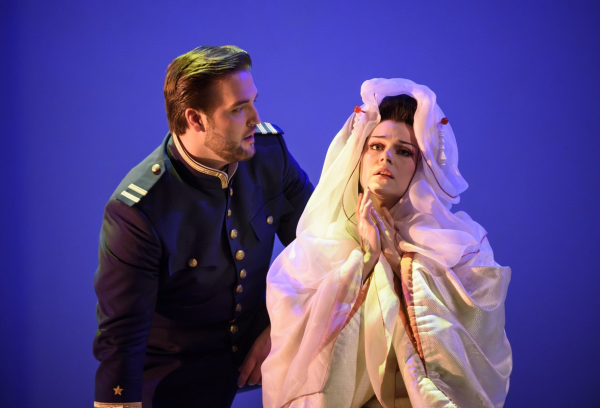Madama Butterfly (Royal Opera House) – 'a tainted relationship'
America meets Japan as Puccini’s tearjerker returns to Covent Garden

© Bill Cooper
The drama of Madama Butterfly stands or falls by the vulnerability and naïvety of its heroine. Cio-Cio-San is only fifteen after all, and the trusting victim of a sex tourist who uses then abandons her with casual heartlessness.
That’s no modern re-reading of the plot: Lieutenant Pinkerton confides his cynical intent to his friend the US Consul Sharpless right at the outset. Thereafter, throughout the first act and even in moments of sweeping romance, Puccini and his librettists unsparingly depict a tainted relationship.
The most moving Butterflys I have seen tap into the girl’s impulsiveness and fantasy-life, as in her impatient reaction to Sharpless’s reading of Pinkerton’s letter. Alas, the problem with this latest revival (by Justin Way) of Moshe Leiser and Patrice Caurier‘s handsome Royal Opera production, first seen in 2003, is the sheer majesty of Kristine Opolais.
It’s no slight to describe the Latvian soprano as an old-fashioned diva; she is super-talented with a rich, ringing voice that burns bright and travels far. But I did not shed a tear. Not only was it hard to identify with the directors’ fondness for stylised lepidopteral movements, but whoever decided that Opolais should deliver Puccini’s money notes in the style of Turandot, huge and hefty with both arms aloft, has an odd perspective on "la piccola Dea della luna" ("the little Moon-goddess").
It’s all of a piece with a set whose overstated pine-framed screens look less Japanese than Scandi-chic. We’re probably not expected to take the production’s architecture literally, I realise, but designer Christian Fenouillat‘s gliding panels make it hard to avoid doing so. The destitute Cio-Cio-San of act two could make a killing selling off her motorised window blinds.
Where Leiser and Caurier score is in the clarity with which they stage the opera’s exposition. The early scenes of Madama Butterfly include a succession of brief visits from minor characters whose identity and significance is often glossed over. Here, thanks to the canny staging, all is crystal clear. Carlo Bosi‘s fussy Goro is a helpful ringmaster, and Jeremy White can rarely have made an entrance quite as eye-catching as the one he enjoys as the Bonze.
Brian Jagde, on an exciting house debut, is the ideal Pinkerton. His voice sustains a lyrical beauty across its range, however forceful the orchestral swell beneath it, while as an acting presence he suggests coltish arousal at the prospect of a play-marriage with his exotic young victim. Gabriele Viviani‘s Sharpless, while equally well sung, is less interestingly defined as a character. Ditto Enkelejda Shkosa‘s Suzuki.
Nicola Luisotti conducts a fiery ROH Orchestra in a felicitous reading that brings the score’s many nuances to vivid life, while the Royal Opera Chorus is its usual stirring self – even though some in the first-night audience sought to recharacterise the gentle Humming Chorus as the coughing chorus.













